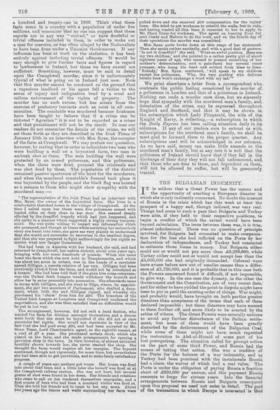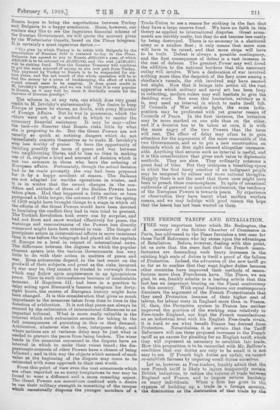THE BULGARIAN INDEMNITY.
IT is seldom that a Great Power has the means and the opportunity of averting a European disaster in which she is only indirectly concerned. No doubt the interest of Russia in the crisis which has this week at least the prospect of a happy end, though indirect, was very real. Things had come to such a pass that Bulgaria and Turkey were able, if they held to their respective positions, to begin a conflict of which the extent would have been beyond calculation. The issue between them was, it is true, almost infinitesimal. There was no question of principle involved, for Bulgaria had consented to make compensa- tion for the loss she had inflicted on the Porte by her declaration of independence, and Turkey had consented to estimate those losses in money. But Bulgaria either could not or would not pay more than £8,280i000, while Turkey either could not or would not accept lees than the £5,000,000 she had originally demanded. Colossal wars have arisen before now out of smaller causes than a differ- ence of £1,720,000, and it is probable that in this case both the Powers concerned found it difficult, if not impossible, to give way. In the one case the dynasty, in the other the Government and the Constitution, are of very recent date, and for either to have yielded the point in dispute might have been to put in peril the existing order of things. War might, and probably would, have brought on both parties greater disasters than acceptance of the terms that each of them declared impossible ; but these disasters may have seemed to them further off, and more likely to be averted by the Dation of others. The Great Powers were severally anxious to avoid any further disturbance of the Balkan settle- ment, but none of them would have been greatly' disturbed by the dethronement of the Bulgarian Czar; while some of them might not have much regretted the restoration to Abd-ul-Hamid of some part of his lost prerogative. The situation called for prompt action on the part of some third Power, and Russia haa the means of taking that action. She was a creditor of the Porte for the balance of a war indemnity, and as Turkey had been punctual with the instalments Russia had a claim the waiver of which had a real value. The Porte is under the obligation of paying Russia a fraction short of £820,000 per annum, and this payment Russia consents to forgo for sixteen years. Into the financial arrangements between Russia and Bulgaria consequent upon this proposal we need not enter in detail. The part of the transaction in which Europe is interested is that Russia hopes to bring the negotiations between Turkey and Bulgaria to a happy conclusion. Since, however, our readers may like to see the ingenious financial scheme of the Russian Government, we will quote the account given by the Westminster Gazette, based on the Time telegram. It is certainly a most ingenious device " Tho plan by which Turkey is to settle with Bulgaria by the Cancellation of Russian debt is restated to-any in the Itintes. Bulgaria has agreed to pay to Russia £320,000 a year, of which 4200,000 is to be interest on £3,280,000, and the rest (2120,000) will be sinking fund. Thus the Russian Treasury will continue to get the same amount of money as she now gets from Turkey. This payment by Turkey to Russia is to be suspended for six- teen years, and the net result of the whole operation will be to find the money by a piece of bookkeeping, the effect of which wOuld almost seem to be magical. It does great credit to ?1, Isvolsky's ingenuity, and we are told that it is very popular pi Russia, as it may well be, since it decidedly counts for the Increase of Russian prestige."
The scheme is, at any rate, one which does very great credit to M. Isvolsky's statesmanship. The desire to keep Europe at peace he shares, no doubt, with every Minister of Foreign Affairs. But he was in possession, which the others were not, of D, method in which to render the necessary financial assistance. It may be easy—after the fact—to discover that Russia risks little by what she is proposing to do. But the Great Powers are not sually so quick at noticing dangers which do not immediately concern themeelves as to make M. Isvolsky's step less worthy of praise. To have the opportunity of deciding possibly the issue of peace and war between two neighbouring States, and to lose no time in making use of it, implies a kind and, amount of decision which is not too common in those who have the ordering of European affairs. Fortunately, though the actual decision had to be made promptly the way had been prepared for it by a happy accident of season. The Balkans are not adapted for warlike operations in winter, and it is in winter that the recent changes in the con- dition and attitude of three of the Balkan Powers have taken place. Had they happened a little earlier or been Postponed a little longer, the autumn of 1908 or the spring of 1909 might have brought things to a stage in which all the efforts of the Great Powers would have been devoted to localising the conflict they had in vain tried to prevent. The Turkish Revolution took every one by surprise, and had not frost and snow worked effectively for peace, the warnings and remonstrances of the Powers less directly concerned might have been uttered in vain. The danger of precipitate action in international affairs is more imminent than it was before the telegraph had placed all the capitals of Europe on a level in respect of international news. The difference between the degrees in which the popular element enters into the various Governments has very little to do with their action in matters of peace and War. Even autocracies depend. in the last resort on the goodwill of their subjects. and great as the risks incerred by war may be, they cannot be trusted to outweigh those 'which mey follow upon acquiescence in eu ignominious peace. Time in such circumstances becomes of incalculable Moment. If Napoleon III. had been in a position to delay acting upon Bismarck's famous telegram for forty- eight hours, the course of European history might have been changed. It is this consideration that gives so much importance to the measures taken from time to time in the direction of arbitration. It is not that peace can always be t.iecured by the submission of international differences to an impartial tribunal. What is more really valuable is the interval which such submission secures for taking in the full consequences of persisting in this or that demand.. Arbitration, whatever else it does, interposes delay, and Where nations are at variance delay may be just what is needed to prevent the peace from being broken. The wiser heada in the countries concerned in the dispute have an interval in which to make their voices heard; the dis- Paesionate counsels of other Powers have a chance of being followed; and in this way the objects which seemed of such value at the beginning of the dispute may come to be estimated with some approach to their real worth. Prom this point of view even the vast armaments which are often regarded as so many temptations to war may be found to wear a different and a more consoling aspect. The Great Powers are sometimes credited with a desire to use their military strength in something of the temper which occasionally disposee the younger members of a Trade-Union to see a reason for striking in the fact that they have a large reserve fund. We have no faith in this theory as applied to international disputes. Great arma- ments are terribly costly, but they do not become less costly by being destroyed. There is no economy in a shattered army or a sunken fleet ; it only means that more men will have to be raised, and that more ships will have to be built. Defeat is always a possible contingency, and the first consequence of defeat is a vast increase in the cost of defence. The greatest Power may well dread the addition to the national burdens that this necessary outlay will involve. When a declaration of war involved nothing more than the despatch of the fiery cross among a, chieftain's Tamils, the risk involved may have seemed but slight, Now that it brings into action all the vast apparatus which military and naval art has been busy in collecting, modern rulers may well hesitate to give the deciding word. But even this hesitation, salutary as it is, may need an interval in which to make itself, felt. If Councils of War seldom tight, the same indis- position may be predicated with yet greater reason of Councils of Peace. In the first instance, the irritation may be more marked on one side than on the other, and if a decision has to be taken at once, it is with the more angry of the two Powers that the issue will rest. The effect of delay may often be to gain attention for the arguments of the more reasonable of the two Governments, and. so to put a new construction on demands which at first sight seemed altogether unreason- able. Anything that secures such an interval is ueeful, and. it is this consideration that gives such value to diplomatic methods. They are slow. They ordinarily consume a great deal of time. But they interpose a breathing-space, in which the first hasty emotion of an indignant people may be tempered. by calmer and more rational thoeghts. Happily there is not the need that there once might have been to preach these commonplaces. In spite of occasional outbreaks of personal or national excitement, the tendency of the European Powers is towards peace. By experience or observation they have learnt what modern warfare means, and we may indulge with good reason the hope that the lesson has not been wasted on them.










































 Previous page
Previous page